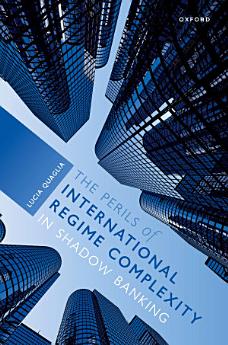The Perils of International Regime Complexity in Shadow Banking
May 2022 · Oxford University Press
Ebook
256
Pages
family_home
Eligible
info
reportRatings and reviews aren’t verified Learn More
About this ebook
Despite the role of shadow banking in the building up of the 2008 international financial crisis, the massive size of this sector, its cross-border nature, and the risks it entails for financial stability, the post-crisis regulation of shadow banking has remained rather feeble. Why? The Perils of International Regime Complexity in Shadow Banking identifies a 'game of shadows', which unfolded recursively concerning the definition, monitoring, and regulation of shadow banking internationally. Thus, states, regulators, and private actors tended to cast light away from various parts of the shadow banking system - shadow banking was (re)fined over time, its measurement was narrowed down, lessening the (perceived) need for regulation. The playing out of such a game was facilitated by the international architecture for shadow banking governance, which is a 'regime complex' characterized by the presence of multiple institutions and elemental regimes governing a set of related issues. Indeed, shadow banking is a quintessential case for demonstrating the perils of international regime complexity, which magnifies problems that are endemic in governing global finance - namely, interstate competition, disagreement between technocratic bodies, and the power of the financial industry - while splintering solutions, due to the fragmentation of regulatory authority. Empirically, this book examines various elemental regimes concerning different aspects of shadow banking, namely: international standards for defining, measuring, and monitoring global shadow banking; international standards for shadow banking entities, including money market funds, hedge funds, and investment funds; international standards for shadow banking activities, such as securitization, securities lending, and repos; international standards for bank capital exposures to shadow banking.
About the author
Lucia Quaglia is Professor of Political Science at the University of Bologna (IT). She was a Professor of Political Science at the University of York (2012-2017) (UK). Quaglia was awarded research fellowships by the Hanse-Wissenschafts Kolleg (DE), the University of Bremen (DE), the Fonds National de la Recherche (Luxembourg), the Max Planck Institute in Cologne (DE), the Scuola Normale Superiore (IT), and the European University Institute (IT). She has published more than 10 books, 6 of which with Oxford University Press. She has guest co-edited 4 special issues of highly ranked academic journals.
Rate this ebook
Tell us what you think.
Reading information
Smartphones and tablets
Install the Google Play Books app for Android and iPad/iPhone. It syncs automatically with your account and allows you to read online or offline wherever you are.
Laptops and computers
You can listen to audiobooks purchased on Google Play using your computer's web browser.
eReaders and other devices
To read on e-ink devices like Kobo eReaders, you'll need to download a file and transfer it to your device. Follow the detailed Help Center instructions to transfer the files to supported eReaders.







